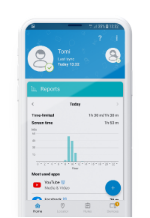The current COVID-19 pandemic has prompted big changes in the whole family dynamic. In countries that have been going through one or more lockdowns, parents have gotten used to knowing exactly where their children are and exactly what they are doing. With the easing of pandemic restrictions, some parents will want to keep an eye on their children and sadly, instead of using parental control apps, they will resort to so-called stalkerware. Unknowingly, this can expose family members’ personal data.
Sometimes called consumer-grade spyware, stalkerware is a stealthy software or a mobile application that monitors its victims without their knowledge or consent. It can track the GPS location of a victim's device, their conversations and images, their browser history, and more. It is often used to secretly track a spouse, romantic interest or sexual partner.
Trust issues
Stalking is a serious issue as it’s often connected to harassment and other forms of violence, and it’s prohibited in many countries and regions. Parents, however, have started to use stalkerware to track their own children, especially if the child is out of sight or spends too much time online.
Let’s be honest: lockdowns, the boredom they bring, and children’s distance learning regimes have increased their screen time. And because of work and other time-consuming obligations, parents are not always available to help their kids explore all the parts of the internet. But that doesn’t mean kids should have zero privacy. Even Article 16 of the UN Convention on the Rights of the Child states: “No child shall be subjected to arbitrary or unlawful interference with his or her privacy…”.
The problem with stalkerware lies not only in the area of parent-child trust. By using stalkerware you can also unwittingly leak personal information about your children, other family members and even yourself.
Stalkerware is not immune from data leaks
In most cases, stalkerware is installed on a mobile phone by someone who has physical access to it: in this case, a parent, legal guardian or other family member. Stalkerware is available both for iOS and Android, but last year Google changed its policy to state that apps “cannot be used to track a person without their knowledge or permission unless a persistent notification is displayed while the data is being transmitted.” This means that if parents want to install a stalkerware app on a child’s phone, they must download it from an unknown source.
Usually, developers of these apps don’t pride themselves on their high level of security. If their apps are not available on Google Play, they don’t have to meet Google’s security requirements. Data collected and transferred by stalkerware usually ends up on third party cloud or physical servers without the user’s consent. As demonstrated in the past, these companies are not immune to data leaks. Imagine that everything that is saved on the mobile phone of your child might leak—family pictures, GPS data about your home, private conversations, and so on. Would you be fine with that?
Yes, it is challenging to raise children in this day and age. No other generation has witnessed such digital shifts in their lifetimes. No other generation of parents has faced so many digital threats targeting their children. But the fact is that open communication and bonding will have a much more positive impact on your children than hidden monitoring and restrictions.
Children need to hear from you why it is not safe to visit certain websites, why it is not healthy to play online games late at night instead of sleeping, and why you cannot trust everything that people post online. How will they trust you if you don’t tell them that you’re monitoring every part of their digital life?
A parental control app is a safer solution
If you need a helping hand in the form of an app, there are always parental control apps. The difference between these and stalkerware is that kids know about the existence of a parental control app on their phone. It is clearly visible on their mobile device and they know what is being monitored. They know that mom and dad will know how much time they spend playing games, or even if they were playing them during schooltime.
Another important fact is that parental control apps are usually made by well-known developers or even cybersecurity companies. They must meet certain security requirements if they want to be available on Google Play or on Apple’s App Store. Therefore, if you think you really need to monitor your child’s digital life, use a proper app that will not leak your family’s private data.


